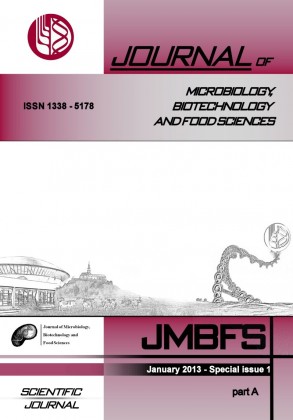STUDY OF THE ADAPTATION PROCESS IN COMMON CARP (CYPRINUS CARPIO L.) AFTER HARVESTING
Keywords:
ammonia, autointoxication, ureotelic, ammonotelic animals, storage pondsAbstract
Fish is sensitive to exogenous and endogenous ammonia. Ammonia formed in fish as a product of metabolism of proteins may be under certain circumstances life-threatening. Ammonia autointoxication is a serious problem and can cause mass mortalities in fish farms. This study focused on the common carp Cyprinus carpio L. in large-capacity breeding farms. It was focused on monitoring the blood ammonia levels in fish blood in the period of metabolic attenuation and the influence of harvesting and handling of fish on the fish's ability to withstand such changes. The study results confirmed the effect of sudden changes in water temperature to values of ammonia in the blood of fish. On the contrary, there were no dramatically increased concentrations of ammonia in the blood of fish nor symptoms of autointoxication. The measured ammonia concentrations ranged between 98.3 ± 56µmol/L and 141.4 ± 31 µmol/L in the monitored period, which corresponds with the study results of other authors. This study has confirmed good technological conditions in the market production of carp after harvesting and a good level of adaptation process of the common carp Cyprinus carpio L. to these changes.Downloads
Download data is not yet available.
Downloads
Published
2013-02-01
How to Cite
BuÅ¡ová, M., & Å tancelová, K. (2013). STUDY OF THE ADAPTATION PROCESS IN COMMON CARP (CYPRINUS CARPIO L.) AFTER HARVESTING. Journal of Microbiology, Biotechnology and Food Sciences, 2(special issue 2), 1194–1204. Retrieved from https://office2.jmbfs.org/index.php/JMBFS/article/view/7441
Issue
Section
Food Sciences
License
Copyright (c) 2013 Milena Bušová, Kristýna Štancelová

This work is licensed under a Creative Commons Attribution 4.0 International License.
All papers published in the Journal of Microbiology, Biotechnology and Food Sciences are published under a CC-BY licence (CC-BY 4.0). Published materials can be shared (copy and redistribute the material in any medium or format) and adapted (remix, transform, and build upon the material for any purpose, even commercially) with specifying the author(s).

